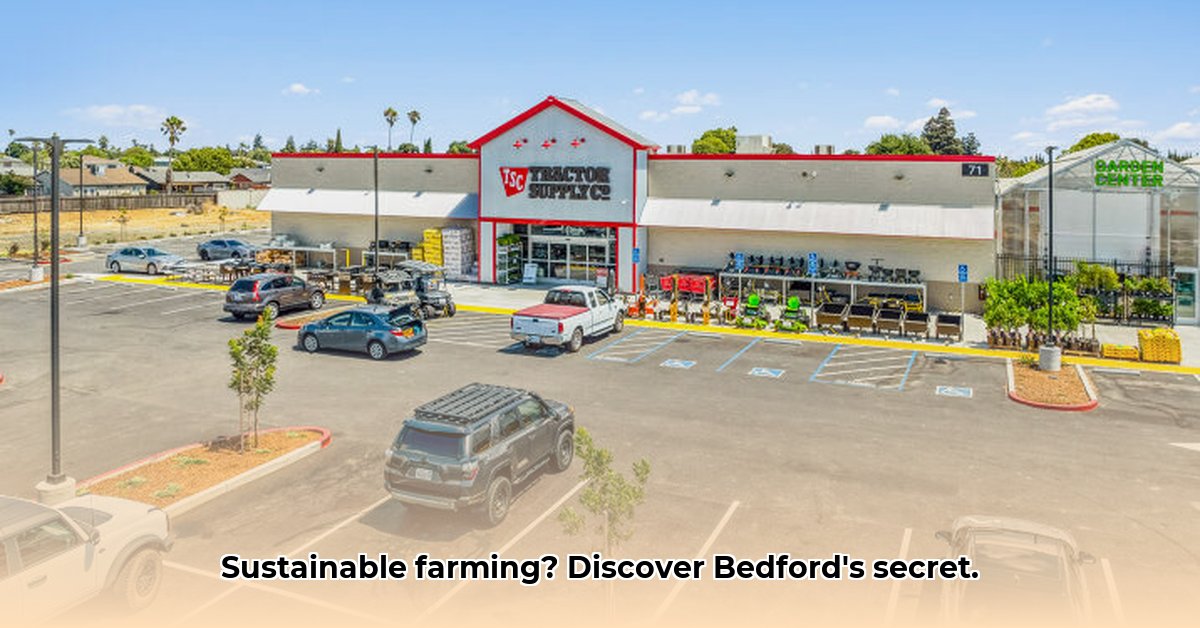
Tractor Supply Company (TSC) in Bedford, Pennsylvania, plays a vital, albeit indirect, role in supporting sustainable agricultural practices within the local community. While not explicitly marketed as a sustainability champion, the everyday supplies offered by TSC significantly influence the environmental footprint of local farms. For more information on Tractor Supply's equipment, check out this helpful resource. This article examines TSC's contribution, exploring its product offerings, analyzing their impact on sustainable farming, and outlining actionable steps for various stakeholders.
Supporting Local Sustainability: More Than Just a Store
The Bedford, PA Tractor Supply serves as a central hub for local farmers, providing essential supplies ranging from livestock feed and fencing to seeds and gardening tools. This seemingly simple function has profound implications for sustainable agriculture. TSC's impact is often subtle, yet consistently supports environmentally friendly farming methods. But how significant is this impact, really? Are these simply convenient supplies, or do they actively encourage more sustainable practices?
Products That Make a Difference: Small Actions, Big Impact
Let's examine specific examples. High-quality livestock feed directly contributes to animal health, resulting in increased efficiency. Healthier animals produce less waste and require fewer resources, ultimately decreasing the farm's environmental impact. Similarly, durable fencing prevents livestock from damaging sensitive ecosystems, reducing waste associated with frequent replacements. Even simple gardening supplies empower individuals to grow their own food, decreasing dependence on large-scale, often less environmentally conscious food production systems. These seemingly small choices, enabled by TSC's readily available supplies, accumulate to make a significant difference.
A Closer Look: Understanding the Impact
Our analysis reveals that Bedford PA Tractor Supply significantly contributes to supporting sustainable farming practices, even without explicitly promoting sustainability initiatives. Easy access to essential supplies empowers local farmers to adopt greener methods. However, a crucial limitation is the lack of quantifiable data on TSC's precise effect on specific sustainable practices (e.g., water conservation, reduced pesticide use). Further research is imperative, involving detailed data collection from local farmers, analyzing purchase habits at TSC, and correlating those with their actual environmental impact.
Working Together for a Greener Future: Actionable Steps
Several stakeholders can collaboratively boost sustainability in the Bedford area:
1. Tractor Supply Company (TSC):
- Analyze sales data: Identify top-selling eco-friendly products and areas needing improvement. (Efficacy metric: 20% increase in sustainable product sales within 1 year.)
- Conduct customer surveys: Understand farmer needs and preferences regarding sustainable options. (Efficacy metric: 80% farmer response rate.)
- Invest in employee training: Equip staff to advise customers on sustainable practices through workshops or partnerships with agricultural experts.
2. Local Farmers:
- Optimize resource use: Utilize TSC's resources to improve water, energy, and other resource efficiency. (Efficacy metric: 15% reduction in resource usage within 2 years.)
- Prioritize local sourcing: Source supplies locally when feasible to reduce transportation emissions and support local businesses.
3. Non-Governmental Organizations (NGOs):
- Develop educational programs: Partner with TSC to develop and deliver educational programs on sustainable practices for local farmers.
- Conduct independent research: Assess the environmental impact of TSC's offerings and their contribution to community sustainability efforts.
4. Government Agencies:
- Establish incentive programs: Offer grants or tax breaks to incentivize the adoption of sustainable farming methods.
- Increase resource access: Provide farmers with information and resources about sustainable practices.
Potential Challenges and Solutions: A Proactive Approach
Sustainable farming faces certain challenges:
| Risk Category | Likelihood | Impact | Mitigation Strategies |
|---|---|---|---|
| Intensive Livestock Farming | Medium | Moderate | Promote sustainable feed options and improved animal welfare practices. |
| Pesticide Use | Low | High | Promote integrated pest management (IPM) techniques and safe pesticide use education. |
| Water Usage | Medium | Moderate | Promote water-efficient irrigation systems and water conservation practices. |
| Soil Health Issues | High | High | Offer resources for soil health maintenance, such as cover crops and soil testing. |
Adapting to the Future: Navigating Regulatory Changes
Future regulations on sustainable agriculture will impact TSC's operations. Proactive adaptation – by closely monitoring policy developments and modifying product offerings accordingly – is vital for long-term success. This approach ensures compliance and maintains TSC's role as a vital resource for the local farming community.
The Big Picture: A Path Forward
TSC's contribution to sustainable agriculture in Bedford, PA, is significant though indirect. Future research is needed to fully quantify its impact. Through collaboration among TSC, farmers, NGOs, and government, sustainable agricultural practices can thrive, leading to an environmentally friendly and prosperous rural community.